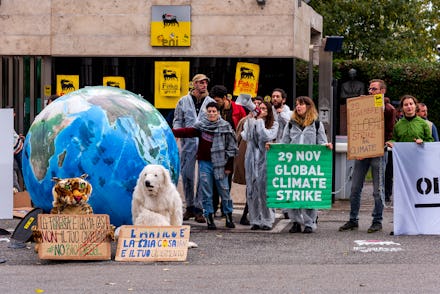We may be too late to prevent some irreversible effects of climate change

In recent years, governments around the world have rallied around checkpoints for emissions reductions designed to limit the effects of climate change. But as we race to lower the levels of greenhouse gases and lessen our reliance on fossil fuels, it's possible those efforts will be too little, too late, even if successful. In the scientific publication Nature, a number of scientists recently warned that we may have already passed several climate tipping points and have entered a "state of planetary emergency."
The scientists argue that our current understanding of where the so-called tipping points are is wrong. It is generally understood that it would require an extreme increase in global temperature, by as much as five degrees Celsius above pre-industrial levels, to see the most dramatic effects of climate change — events like the complete loss of the Amazon rain forest or the West Antarctic ice sheet. Recent research suggests those changes could occur with an increase as little as one or two degrees Celsius. Temperatures have already exceeded the one-degree mark and are projected to continue rising well past two degrees if dramatic changes aren't made soon.
This does not bode well for humanity. We have not been ambitious enough in our attempts to mitigate climate change. For years now, the United Nations' Intergovernmental Panel on Climate Change (IPCC) has set a goal to limit the global temperature increase to 1.5 degrees Celsius, arguing that while it will carry some climate-related challenges, the situation would largely be manageable. The one major, global climate-related initiative, the Paris Climate Agreement, sets its goal at preventing a two-degree increase. That half-degree makes a huge difference. That seemingly small uptick in temperature could be the difference between the Arctic experiencing significant amounts of melting ice, contributing to a sea level rise. It's the difference between already drought-prone regions suffering from more extreme heat, stronger and more devastating hurricanes and more intense heat waves and other extreme weather events.
Making matters even worse is that most signs point to us falling short of even the Paris Climate Agreement's insufficiently ambitious goal. According to Climate Action Tracker, an organization monitoring the progress of 32 countries that signed onto the Paris Agreement, our current levels of greenhouse gas emissions would result in a temperature increase of between 2.4 degrees and 4.3 degrees Celsius, with the most likely outcome about 3.2 degrees Celsius by 2100. That's more than double the goal set by the IPCC. Even if countries meet their pledges, it might not be enough. Climate Action Tracker's projects current pledges would achieve a temperature increase of between 2.3 and 3.7 degrees Celsius — still well above the tipping points that we should be aiming for. It is still possible to cap the global temperature increase at 1.5 degrees Celsius, but it will require a major undertaking that would cut greenhouse gas emissions by 45 percent by the year 2030 and reach zero emissions by 2050, according to the UN.
The problem, according to scientists writing in Nature, is that even if we achieve that goal — which we absolutely should be aiming for — we may have already crossed the tipping point for some major and irreversable damage. For instance, we may have already done enough damage to lead to major ice collapse. Scientists warn that the Amundsen Sea embayment of West Antarctica may already be on the brink of collapse, which could result in the entire West Antarctic ice sheet toppling. If that were to happen as projected, we could see sea levels rise by as much as three meters. The temperature rise that we have already experienced may also be bad enough to result in the loss of as much as 99 percent of all tropical corals, which would destroy marine biodiversity and have devastating effects on ocean wildlife and human livelihoods.
These types of warnings are not meant as a reason to give up and accept that we will be unable to prevent these changes to the planet. Quite the opposite, they are intended to be a rallying call to take the issue seriously. The scientists point to students rallying behind the Global Climate Strike earlier this year as having the right mindset. We are in the midst of a global crisis, and it's time to treat it with the appropriate level of urgency rather than pushing it off for future generations.